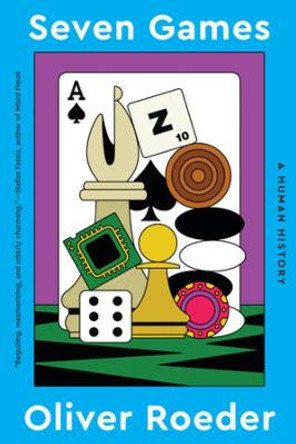Description
Checkers, backgammon, chess and Go. Poker, Scrabble and bridge. These seven games, ancient and modern, fascinate millions of people worldwide. In Seven Games, Oliver Roeder charts their origins and historical importance, the delightful arcana of their rules and the ways their design makes them pleasurable.
Roeder introduces thrilling competitors, such as evangelical minister Marion Tinsley, who across fourty years lost only three games of checkers; Shusai, the Master, the last Go champion of imperial Japan, defending tradition against "modern rationalism" and an IBM engineer who created a backgammon programme so capable at self-learning that NASA used it on the space shuttle. He delves into the history and lore of each game: backgammon boards in ancient Egypt; the Indian origins of chess; how certain shells from a particular beach in Japan make the finest white Go stones.
Beyond the cultural and personal stories, Roeder explores why games, seemingly trivial pastimes, speak so deeply to the human soul. He introduces an early philosopher of games, the aptly named Bernard Suits, and visits an Oxford cosmologist who has perfected a computer that can effectively play bridge, a game as complicated as human language itself.
Throughout, Roeder tells the compelling story of how humans, pursuing scientific glory and competitive advantage, have invented AI programmes better than any human player and what that means for the games-and for us. Funny, fascinating and profound, Seven Games is a story of obsession, psychology, history and how play makes us human.
About the Author
Oliver Roeder has been a senior writer at FiveThirtyEight and editor of The Riddler. He studied artificial intelligence as a Nieman Fellow at Harvard University and holds a PhD in economics focused on game theory. He lives in Brooklyn, New York.
Reviews
"The games that have preoccupied and fascinated us over millennia tell a story not just about human history but, crucially, about the nature of the human mind. Oliver Roeder's Seven Games offers a sweeping and provocative tour of the labyrinths into which we so eagerly lose-and so revealingly find-ourselves." -- Brian Christian, author of Most Human Human and The Alignment Problem
"Seven Games is exciting and personal - you can sense Roeder's emotional investment. The book is also built on richly fleshy characters profiled by Roeder - both the human game champions and the AI designers who beat them." -- James Mcconnachie - Times Literary Supplement
"A journalist and gaming geek, Roeder's book is part memoir and part meditation on the way in which overwhelming machine superiority is changing both games and those who play them. His account is perceptive in particular on the oddities of gaming subcultures, most notably those he plays well himself such as Scrabble, where he was briefly one of the 200 or so best players in the US." -- James Crabtree - Financial Times
"Illuminating....a fascinating group biography of some of the most popular games of all time....offers powerful insights into why we play games and what we can learn from them....accessible, enjoyable....raises provocative and sometimes unsettling questions about the nature of intelligence and the unintended consequences when machines play better than we do....If you are intrigued by this rare opportunity to pull back the curtain on how humans and computers learn, then you will be richly rewarded." -- The Washington Post
"Part memoir and part meditation on how games ranging from chess through checkers to poker have changed in an era when AI-powered computers crush the best human players. Roeder... is especially good on the oddities of gaming subcultures." -- Simon Kuper - Financial Times
Book Information
ISBN 9781324003779
Author Oliver Roeder
Format Hardback
Page Count 320
Imprint WW Norton & Co
Publisher WW Norton & Co
Weight(grams) 557g
Dimensions(mm) 236mm * 160mm * 25mm
Details
Subtitle: |
A Human History |
Imprint: |
WW Norton & Co |








